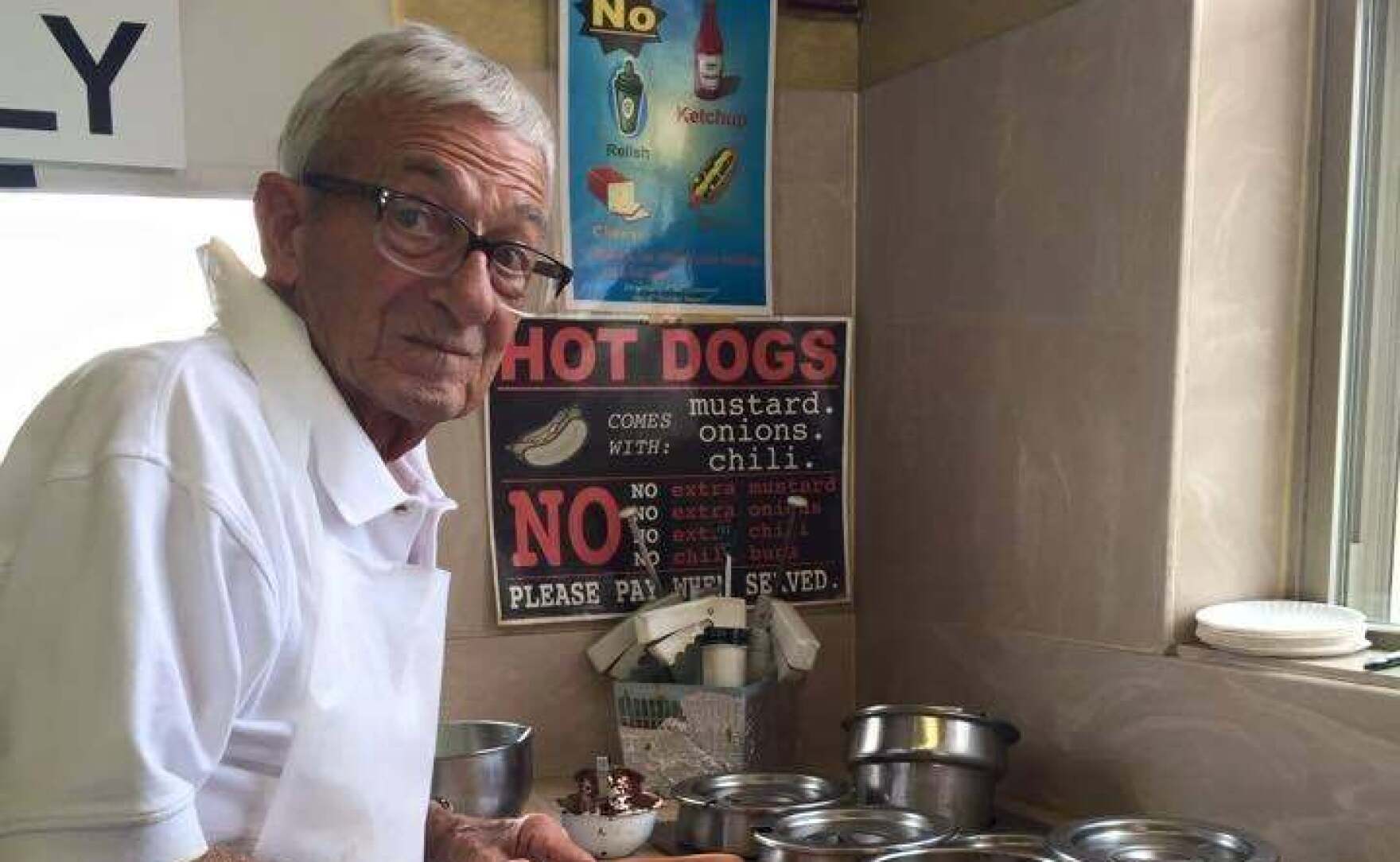Yann’s Hotdogs in Fairmont, West Virginia is easy to miss, if you’re not looking. It doesn’t even have a sign out front. Inside, there are only nine seats at the lunch counter. It’s a tiny place. But Yann’s has a huge, devoted following.
There are regulars who go there for lunch every day. There’s even a story about a homesick West Virginia boy stationed in Korea, who had his mom cold-pack the dogs and ship them overseas.
But if you wanted a dog from Russell Yann — the iconic restaurant’s equally iconic owner, who died on Jan. 15, 2021 — there were some rules to follow.
Hotdogs at Yann’s come with three toppings: mustard, diced onion and Yann’s special spicy sauce. You could ask Yann to leave any of those things off. But for goodness sakes, don’t ask for anything extra.
“You would never say ketchup,” said U.S. Magistrate Judge Michael Aloi, who used to practice law in Fairmont and knows the rules well. “If you said ‘ketchup’ you might as well just leave the place. All the regulars, their heads would pop up. You didn’t say ketchup. And it may be a felony in Marion County to have requested slaw on the hotdog.”
Yann was serious about his hotdogs. His parents started the restaurant in 1927. He started helping out when he was just five years old, and he promised his parents he’d keep the business going after they were gone.
Yann was so adamant about making the dogs, and making them his way, that he’d get kinda gruff if customers tried any funny business.
After he died, the Marion County Convention and Visitors Bureau shared a photo of him that captures this.
It’s a photo of Yann, standing behind the counter just like he did every day. He’s a smallish guy with white hair and glasses, dressed in a white polo shirt and a white apron. There are 18 hot dogs buns laid out in front of him, ready to be filled and served to customers. And he looks miffed that someone is taking his photo.
But really, that gruffness was just Yann’s sense of humor.
Marion County Sheriff Jimmy Riffle worked for Yann for over 20 years and got to see the man behind the act.
“If there was a fire in the community, usually when the firefighters got back to the station, there would be hotdogs and drinks for them,” Riffle said. “He had a routine of, every Tuesday, sending hotdogs and drinks to the West Virginia State Police because that was the day, back then, when they gave drivers exams and a lot of times they didn’t get out of the office for lunch.”
“If there was a bad wreck or the police departments were out and the rescue squads were out, whenever they got back to the station there was always something for them,” Riffle said.
Yann showed that kind of courtesy to all his customers.
“If you’d gone in there more than once or twice. He would remember your order,” Riffle said. “Customers would just come in, sit down and we knew what they wanted. He’d make them and I’d set them in front of them.”
He was known to occasionally sneak Little Debbie Cakes in with kids’ orders. And he took the hotdogs on vacation with him.
“He used to make trips to Disney World in Florida. He would take stuff to make hot dogs there and make them for the staff and workers in Disney World,” Riffle said.
Aside from those Florida vacations, Yann was a constant presence at his restaurant. Even as he got older and his daughter Cathy Galambus returned home to help him run the place.
“Truly, he didn’t know anything else,” Galambus said. “He came from an Italian family that worked hard and he never really had any hobbies or anything. So he always said, ‘What would I do if I stayed home? I wouldn’t do anything. I would have anything to do.’ So he came to work.”
“And he loved it here,” she said. “This was his home. This is what he knew. And he enjoyed the people. It’s just the type of person he was and the background he came from.”
Then, of course, the COVID-19 pandemic hit.
Yann, 89 at the time, started staying home more to keep from getting sick. But he still made time to pass along the restaurant’s secrets to Galambus, including the recipe for the restaurant’s famous sauce, which until recently was known only to Yann.
“I moved back here with my dad when my mother passed away,” Galambus said. “And my promise to him was to keep it going. So that’s what I’m doing.”
The restaurant wasn’t open for several days following Yann’s death. A sign hung on the door. “Closed. Family Emergency.” Per his wishes, there was no public funeral.
But by the end of January, Galambus had the place back open. And ever since, the restaurant has been swamped by folks, coming by to get a few hotdogs and pay their respects to her dad.
“I can’t even begin to tell you how busy we’ve been. That’s the people outpouring their love back in,” Galambus said. “I don’t think he knew the impact he made on the community. He just did what he thought was the right thing. And everybody thought he was gruff and had a rough exterior, but he was really really soft at heart.”
Even his avowed hatred of ketchup had a reasonable explanation. Back in the day, Galambus says, the restaurant actually offered ketchup if customers wanted it. In those little packets. But one day during the lunch rush, a customer decided to smash one of the packets with a fist, right on the counter.
“It went everywhere,” Galumbus said.”It went all over the walls, all over the ceiling, everywhere. And that was the end of it. That put him over the edge.”
From that time on, ketchup was forbidden in Yann’s. He even kept a boombox behind the counter loaded with a clip from the movie “Dirty Harry: Sudden Impact.” If a customer asked for ketchup, Clint Eastwood’s disembodied voice would growl: “Nobody … I mean nobody … puts ketchup on a hotdog.”
And much like Inspector Harry Callahan, Yann was a larger-than-life character.
“You didn’t forget him once you met him,” Sheriff Riffle said. “He’ll be missed. Not just by family and friends, but by the community in general,” he said. “It’s one of those things, when somebody passes away … There won’t be another one.”
This story is part of the Inside Appalachia Folkways Reporting Project, a partnership with West Virginia Public Broadcasting’s Inside Appalachia and the Folklife Program of the West Virginia Humanities Council. The Folkways Reporting Project is made possible in part with support from Margaret A. Cargill Philanthropies to the West Virginia Public Broadcasting Foundation. Subscribe to the podcast to hear more stories of Appalachian folklife, arts and culture.





















